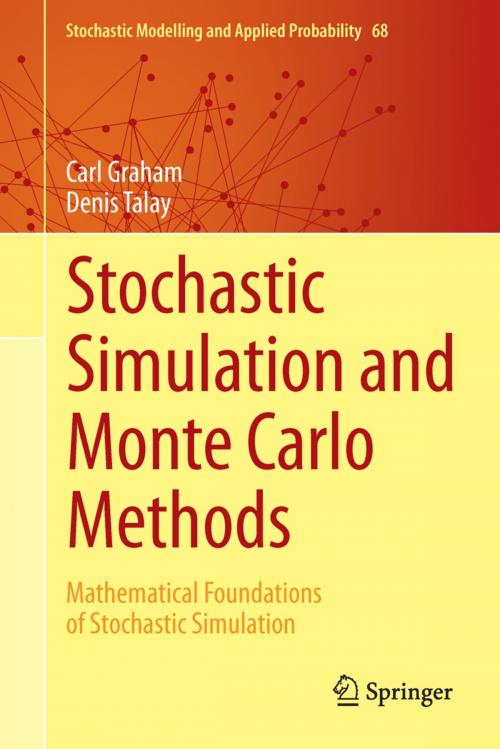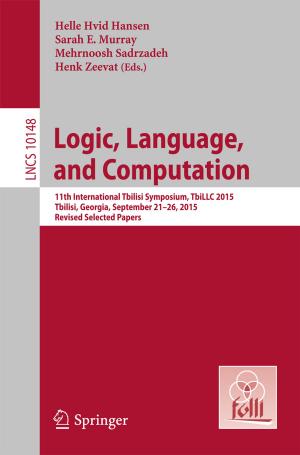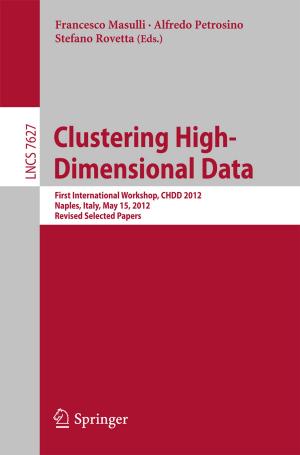Stochastic Simulation and Monte Carlo Methods
Mathematical Foundations of Stochastic Simulation
Nonfiction, Science & Nature, Mathematics, Number Systems, Statistics| Author: | Carl Graham, Denis Talay | ISBN: | 9783642393631 |
| Publisher: | Springer Berlin Heidelberg | Publication: | July 16, 2013 |
| Imprint: | Springer | Language: | English |
| Author: | Carl Graham, Denis Talay |
| ISBN: | 9783642393631 |
| Publisher: | Springer Berlin Heidelberg |
| Publication: | July 16, 2013 |
| Imprint: | Springer |
| Language: | English |
In various scientific and industrial fields, stochastic simulations are taking on a new importance. This is due to the increasing power of computers and practitioners’ aim to simulate more and more complex systems, and thus use random parameters as well as random noises to model the parametric uncertainties and the lack of knowledge on the physics of these systems. The error analysis of these computations is a highly complex mathematical undertaking. Approaching these issues, the authors present stochastic numerical methods and prove accurate convergence rate estimates in terms of their numerical parameters (number of simulations, time discretization steps). As a result, the book is a self-contained and rigorous study of the numerical methods within a theoretical framework. After briefly reviewing the basics, the authors first introduce fundamental notions in stochastic calculus and continuous-time martingale theory, then develop the analysis of pure-jump Markov processes, Poisson processes, and stochastic differential equations. In particular, they review the essential properties of Itô integrals and prove fundamental results on the probabilistic analysis of parabolic partial differential equations. These results in turn provide the basis for developing stochastic numerical methods, both from an algorithmic and theoretical point of view.
The book combines advanced mathematical tools, theoretical analysis of stochastic numerical methods, and practical issues at a high level, so as to provide optimal results on the accuracy of Monte Carlo simulations of stochastic processes. It is intended for master and Ph.D. students in the field of stochastic processes and their numerical applications, as well as for physicists, biologists, economists and other professionals working with stochastic simulations, who will benefit from the ability to reliably estimate and control the accuracy of their simulations.
In various scientific and industrial fields, stochastic simulations are taking on a new importance. This is due to the increasing power of computers and practitioners’ aim to simulate more and more complex systems, and thus use random parameters as well as random noises to model the parametric uncertainties and the lack of knowledge on the physics of these systems. The error analysis of these computations is a highly complex mathematical undertaking. Approaching these issues, the authors present stochastic numerical methods and prove accurate convergence rate estimates in terms of their numerical parameters (number of simulations, time discretization steps). As a result, the book is a self-contained and rigorous study of the numerical methods within a theoretical framework. After briefly reviewing the basics, the authors first introduce fundamental notions in stochastic calculus and continuous-time martingale theory, then develop the analysis of pure-jump Markov processes, Poisson processes, and stochastic differential equations. In particular, they review the essential properties of Itô integrals and prove fundamental results on the probabilistic analysis of parabolic partial differential equations. These results in turn provide the basis for developing stochastic numerical methods, both from an algorithmic and theoretical point of view.
The book combines advanced mathematical tools, theoretical analysis of stochastic numerical methods, and practical issues at a high level, so as to provide optimal results on the accuracy of Monte Carlo simulations of stochastic processes. It is intended for master and Ph.D. students in the field of stochastic processes and their numerical applications, as well as for physicists, biologists, economists and other professionals working with stochastic simulations, who will benefit from the ability to reliably estimate and control the accuracy of their simulations.















